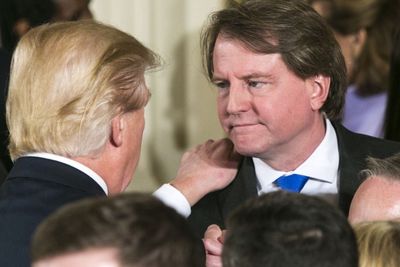Most white-collar prosecutions turn on the issue of criminal intent. These cases involve behavior that would, in ordinary circumstances, be totally legal—if not for the intent of the defendant. Consider, for example, the entrepreneur who sells stock in a company whose value goes down. If business conditions turn sour, or the competitive environment changes, the loss is simply part of the risks of capitalism. There's no crime. But if the entrepreneur knows that his company has no value, or has lied about its assets, then he has committed fraud. Insider trading is another example. It's only criminal to sell stock if you had improper knowledge of the status of the company. In both kinds of cases, the key question regards the defendant's state of mind. That's why lawyers refer to "intent cases"; the outcome turns solely on the motivation of the defendant.
The issue of whether President Trump obstructed justice centers on his decision to fire James Comey, the F.B.I. director, last May. This is a classic intent case. The President clearly had the right to fire Comey, but he did not have the right to do so with improper intent. Specifically, the relevant obstruction-of-justice statute holds that any individual who "corruptly . . . influences, obstructs, or impedes, or endeavors to influence, obstruct, or impede, the due administration of justice" is guilty of the crime. "Corruptly" is the key word. Did Trump act "corruptly" in firing Comey?
It is this question of corrupt intent that makes the Times'srecent blockbuster scoop so important. According to the article, the President tried to fire Robert Mueller, the special counsel, last June, but he stopped when Don McGahn, the White House counsel, threatened to resign if Trump insisted on the dismissal. Trump apparently offered three justifications to fire Mueller—that Mueller had left one of Trump's golf clubs in a dispute about dues; that Mueller's former law firm had represented Jared Kushner, the President's son-in-law; and that Trump had interviewed Mueller as a possible interim replacement for Comey as F.B.I. director. McGahn's threat to resign shows that he saw these purported reasons as pretexts. The golf-dues matter was obviously trivial; the law firm's representation of Kushner, which did not involve Mueller at all, could only have biased the special counsel in favor of the President's family; and Trump's willingness to interview Mueller for the F.B.I. position showed how much the President trusted Mueller, not that he believed the former F.B.I. director harbored any animosity toward him.
McGahn recognized the key fact—that Trump wanted to fire Mueller for the wrong reasons. Trump wanted to fire Mueller because his investigation was threatening to him. This, of course, also illuminates the reasons behind Trump's firing of Comey, which took place just a month before the President's confrontation with McGahn regarding Mueller. Trump and his advisers have offered various tortured rationalizations for the firing of Comey—initially, for example, on the ground that Comey had been unfair to Hillary Clinton during the 2016 campaign. Trump himself came clean in an interview with NBC's Lester Holt and in a meeting with Russia's foreign minister. In both, Trump acknowledged that he fired Comey to stall or stop the Russia investigation—that is, the investigation of Trump himself and his campaign.
This was an improper purpose, and McGahn clearly saw that the same improper purpose underlay Trump's determination to fire Mueller. So McGahn issued the ultimatum that prompted the President to back down.
Mueller and his team surely have evidence on obstruction of justice that has not yet been made public. But even on the available evidence, Trump's position looks perilous indeed. The portrait is of a President using every resource at his disposal to shut down an investigation—of Trump himself. And now it has become clear that Trump's own White House counsel rebelled at the President's rationale for his actions.
Abundant questions remain about Trump's fate in the Mueller investigation. Can or will a sitting President be indicted? What, if anything, will the House of Representatives do with respect to its impeachment powers? In what forum and format will the public see the full range of the evidence against the President? But on perhaps the most important question of all—whether the President of the United States committed the crime of obstruction of justice—the answer now seems clear.
Jeffrey Toobin,New Yorker, January 26, 2018
###
January 27, 2018
Post Script. Didyou know that you don’t have to succeed at an action to be guilty of intent? Trump!
